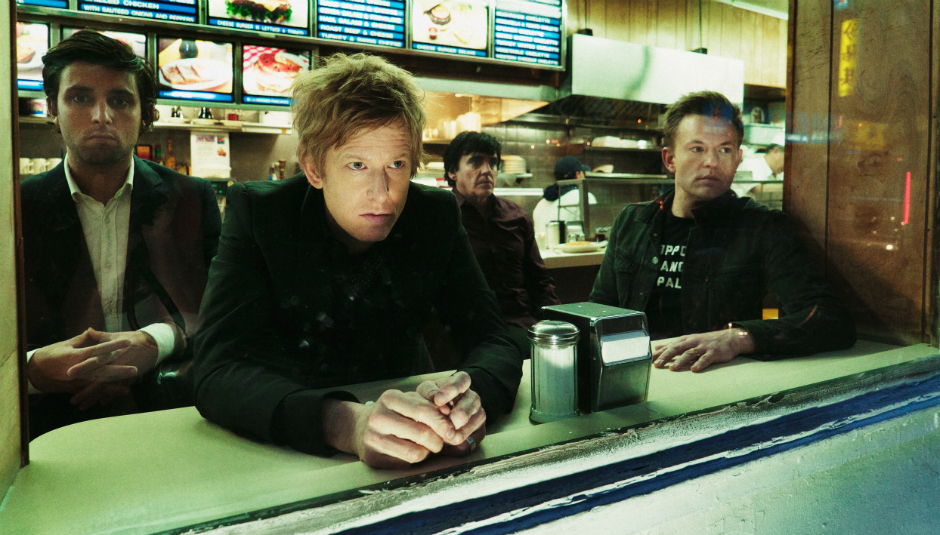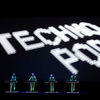In the lobby of a plush Kensington hotel, I sit and wait for Britt Daniel.
Behind me, two WWE executives are sat on a conference call, discussing their marketing strategy for China with much fervour and many a buzzword.
I tell Britt about this when he arrives – leather white denim jacket atop tour-whittled wiry frame – and he’s amused.
“Earlier, we were in the elevator and some British person said ‘This hotel is just too American’.”
Whatever that might mean, and the snake oil merchants sat behind us might have something to do with it, it’s clear that Britt isn’t part of the problem.
Reserved yet straight-talking, self-aware yet secure in his ambition, he’s not someone you’d paint in broad brushstrokes as “too American”.
It suits the band he leads. 23 years in the making, Spoon are nuanced, dedicated and consistently excellent songwriters (infamously they were Metacritic’s best-reviewed band of the 00s), and the result is a fittingly slow-burning yet hard-won level of success. Think Austin – not LA – famous.
The foundation for all this is a relentless desire to both tighten every screw and push the envelope, to innovate and explore new sounds whilst constantly honing the key ingredients of their sound. Setting out into new waters and never forgetting the harbour.
The band’s latest record Hot Thoughts, is a testament to a process.
“What happens is that we’re working on a lot of songs at once – so we were working on maybe 40 songs, or song ideas – and as we go along we get to the point with one where we go ‘Ah! That’s definitely going to be usable, that’s good’. And then we keep working on a bunch more until ‘We’ve got another one!’”
“And as that’s happening, we can kind of figure out what the record needs. I was excited having some very direct songs and then some weirder songs that were different for us. I like the idea of that challenge, because when I listen to bands that I’ve known for a while, I like it when they push it and they do something new… but only if it’s good. They can try to do something new and it can be stupid, but I felt pretty confident that this was new, but cool.”
Perhaps as a result of that process, I put it to Britt that it sounds like a record that was fun to make, moods shifting and sounds morphing throughout, and that curious spirit and diverse output seems a direct result of a song-writing process that sounds a bit like fishing.
“‘We got one!’ It’s all about that. One of the worst parts of making a record though, one of the most frustrating parts is when you feel like you’ve got one and then you come back to it, or you start recording it and you’re like ‘Fuck! I thought this was all together?’ Because it’s never really there until it’s mixed. And that happens too often.”
With all these stunted tracks left on the cutting-room floor, it’s interesting that the last tracks standing have formed the band’s most synth-heavy, electronic-tinged record, a development from elements that began to rise to prominence on 2014’s They Want My Soul. It’s a progression that’s been a tad divisive in some quarters, but Britt is crystal clear on the intent behind the move.
“Maybe it’s not going to be everybody’s thing, but I’m not doing it for everyone.”
Which brings to mind, one particular review, which claimed that Spoon have “no idealistic aims to be anything more than a career band, making themselves happy.”
“I think that’s really the way you should do it. Nobody knows better than the artist how to make the art. And if you’re the kind of artist that’s looking for someone else to tell you what’s good – that doesn’t mean I’m not open to suggestions, I send things around and ask – but I do think that when we put the record together, we’ve got to think to ourselves: ‘Does this feel good to us?’”
“Because if it doesn’t, we’re not going to want to go out and play it for a year, and we’re not going to be pleased when we put the record on again in six months time. And maybe some bands just aren’t good at knowing when something is good, but I feel we are good at knowing, we know what we like. So maybe it’s an accurate statement, but I get the impression it wasn’t meant with a lot of compliment.”
This last is met with a sardonic chuckle, but I can see the frustration of being put in a box by the press. Particularly when, as proven by everyone from Pepsi’s Kendall Jenner-error and the ire with which U2 are received these days, “idealistic aims” can quickly prove cynical, particularly when they enter the realm of politics.
“I think that we’re idealistic in terms of that we want to make the ideal record. What do they mean by idealistic? We do not give up until we make a classic record. So in that sense, we are idealistic.’
“There have been times where I’ve thought, who needs to be political? Not every band is good at it, not every band needs to. Certainly we haven’t always been vocal. Instead, we’ve done things quietly. Like, we’ve invited organisations to display and hand out materials at our shows, to go out on the entire tour with us for instance. And lately, we’ve gotten a little bit more overt with our social media about some political stances. So, we do a bit of it. But I don’t think it’s required.”
Which raises the question of ‘Tear It Down’ in particular, the band’s most overtly political song to date. Like most things from the band’s song-writing process, that wasn’t necessarily the intention.
“The way it happened is that the chorus came first. I was working with an artist called LP, and she came up with a melody that sort of rhymed with ‘tear it down’, so I said let’s make that ‘na-na-na-na-na-na tear it down’. And then we were like: ‘OK, let’s finish the lyrics. What’s the next thing? What are we trying to tear down? A wall!”’
“That was just kind of thrown out there, and then I realised that it might sound very topical. So I said let’s let it sound topical. And then the rest of the song came later, with verses, lyrics etc. that came from my impressions after a terrorist attack. Politically, [the verses and chorus are] all in the same ballpark, it’s all the same world, but maybe you kind of have to connect some dots yourself after the fact… and what’s wrong with that?”
There’s that domino effect process again, the rewards of gradual song-writing development rather than up-front intent or pretence.
“I mean, yeah, maybe some bands are good at saying: ‘I want to write a song about a terrorist attack’, but for me, I just jotted down some thoughts right when it happened because I was feeling them, and then later on I was like, maybe I can throw them in there?’
“But it wasn’t like I sat down with the intention this song is going to be about this. That might work for like, Paul McCartney. Although to be fair, that’s not true, because Paul McCartney is always a melody-first guy and then he comes up with the lyrics later.”
“There’s that story that the first lyrics for ‘Yesterday’ were “scrambled eggs, oh my darling how I love your legs”. I don’t know, everyone’s different. I admire people who can riff on lyrics and can just come up with some many words that they have an excess of them. I don’t really have that skill; I have it to a smaller degree. I can riff, but I’m better at riffing musically, the lyrics usually is something that’s a little more… I get it where I can.”
Which on paper does the quality of Britt’s lyrics a bit of a disservice, but it fits with the idea of himself of being “a musician, not a rockstar” as he put it another interview, putting the music first rather than the trappings around it.
“That’s true, but that’s not to say I don’t get what’s powerful about being on stage. I get a kick out of it for sure, being in a club full of tons of people that are really into your music and what goes down that night. That’s amazing. You might say that that’s a bit rockstar.”
Another aspect of Britt that’s a bit more traditional rockstar, is his steadfast belief in the album as a format and a canvas.
It’s true of the album artwork he selects. “It paints a picture that’s such a big part of the impression you’re going to take from the album. I just hate it when bands put out an album and you can tell that they just did not put any effort into the album cover. That’s lame. You’ve got to put the effort in.”
It’s also true of how he chose the album title. “[Hot Thoughts] is a good title, a strong title, suggestive, succinct, kind of colourful and I wanted to do that thing we haven’t done before, where the title-track is the first song and sort of establishes that this is what the album is about.’
“It’s a big bam, here’s where we’re at, here’s where we’re starting and bam, I’m going to hit you over the head with it. Prince was really good at that with Controversy, Sign O’ The Times, 1999… “Hey this is 1999 and we’re going to get right into it with ‘1999’. And if the first single on the record can be that same song then even better, and that was our first single so we did it. I just thought it was a cool package all together.”
And last, but by no means least, it’s particularly true of how he sequences records. Hot Thoughts contains the band’s vastest sonic spectrum yet, from the abstract jazz and – for want of a better word – experimental, nature of ‘Pink Up’ and ‘Us’ to tracks that sway with their trademark swagger like ‘First Caress’, killer single ‘Can I Sit Next To You’, and even the slow-burning rush of ‘Whisperi’lllistentohearit’. And yet the record is ideally structured for the Side A / Side B rhythm of vinyl in flow, the band moulding a true journey out of the varied styles and moods of each well-contained half.
“It makes it more fun for us and hopefully for listeners too. You hear a lot of talk about how albums don’t matter or whatever - doesn’t that seem like a thing that people talk about? Well if that’s the case, why does every major artist still put out albums? Because that’s how they do it. Because it does matter. It’s a way of presenting where you’re at, at a certain period of time, and it’s still the way that everything is set-up.’
“If you put out a single you’re not going to get the press. I’m not going to be talking to you. I’m not going to get to talk to Drowned in Sound probably, if I just put out a single once every three months even if it’s the same amount of music released over the same amount of time.’
“We used to have the same frustration with EPs. We would work our asses off on an EP like Soft Effects, which I still think is one of the best things we ever did. We put all this effort into it like “people are going to love this!” But nobody really heard about it, because it’s an EP and the system isn’t set-up to digest that. So I believe in the album.”
It’s a belief that’s palpable in the listening, the result of a band fuelled by renewed confidence once more, stronger for having been through the cycle of ‘write, release, tour, write, release, tour’ once more after the long break between Transference and They Want My Soul.
“It kind of reminds me a little bit of… this might sound a bit pretentious, but at the risk of that…it kind of reminds me a bit of when Bowie came back after not making records for 10 years. And the record he came be back with after 10 years [The Next Day] was good right? It was a good record and everyone was excited to hear from him. And then the record after that [Blackstar] was just fucking phenomenal. It was like he’d got it out of his system.’
“And I feel for us it’s less about feeling less pressure or whatever, it’s more about just getting back into the rhythm of it. The more you’re in that headspace of working together and writing songs, the better it’s going to be. The hard thing is the transitions. And I like our last record a lot, but I think this one is a progression and a step forward. I do feel, at the risk of sounding corny, revitalised.”
Hot Thoughts is out now via Matador Records. For more information on the band, please visit their official website.
Spoon play a run of shows in the UK this week. For tickets, click here.
Manchester, Gorilla, Tuesday 27 June
Glasgow, The Arts School, Wednesday 28 June
London, O2 Forum, Friday 30 June.






















